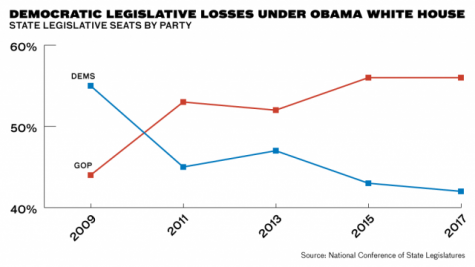According to The Hill on Monday, a number of GOP senators are hesitant about, if not outright opposed to, eliminating the filibuster. The article names seven of them, more defections than a likely caucus of 52 could withstand on a vote. For anyone who doesn’t want to see them be able to ram through their anti-worker, anti-environment, anti-consumer, anti-democracy (etc.) agenda, this is great news.
But don’t get too excited. Because in addition to budget reconciliation — a tool Paul Ryan has already hinted at using, and which reduces the required Senate votes for passage to a simple majority — House Republicans have at their disposal a strategy that has succeeded quite well for them over the past few years: policy riders in must-pass bills.
Time after time, Republicans have attached a host of toxic policy riders to government spending bills (whether continuing resolutions or omnibus bills)—and Democrats still vote for them.
Take, for example, the Continuing Resolution (CR) that passed this September. As I noted earlier this week, it contained a provision blocking the SEC from developing, proposing, issuing, finalizing, or implementing a rule requiring public companies to disclose political spending to their own shareholders. Only 12 Senate Democrats and 10 House Democrats voted against it—and some of that opposition was more a result of how the CR punted on Flint funding (a punt that was condemnable in and of itself).
Last year’s end-of-year omnibus bill included a grab-bag of horrible policy riders (“a basket of deplorable” riders, if you will), including, among other things:
- A lift of the 40-year ban on domestic oil exports
- A ban on the SEC’s crafting a rule to require corporations to disclose political spending (a rider that re-appeared this September, as noted above)
- An elimination of country-of-origin labeling requirements for meat and poultry
- The “surveillance-masquerading-as-cybersecurity” bill CISA
- Exemptions from Dodd-Frank for certain derivative swap trades
- Changes to the “visa waiver” program derided as rank discrimination by the ACLU
But only 18 House Democrats and 9 Senate Democrats voted against it.
In 2014, the “CRomnibus,” the combination Continuing Resolution (CR) and appropriations bill (omnibus), offered a holiday feast to lobbyists with its range of policy riders:
- A provision to weaken campaign finance regulations by increasing the amount that an individual can donate to a party committee in a year from $32,400 to $324,000
- A provision—written by Citigroup lobbyists—to weaken regulation of credit default swaps under Dodd-Frank and allow banks like Citigroup to do more high-risk trading with taxpayer-backed money
- A provision allowing trustees of multi-employer pension plans to cut pension benefits to current retirees
- An override of DC’s recent vote legalizing recreational marijuana
- A provision to extend the length of time that truckers can be required to work without breaks
- The elimination of a bipartisan measure to end “backdoor” searches by the NSA of Americans’ private communications
- A provision to block the EPA from regulating certain water sources
- A reduction of nutrition standards in school lunches and the Women, Infant and Children food aid program in order to benefit potato farmers
- A halt on the listing of several species on the Endangered Species List (in accord with the oil industry’s wishes)
- A prohibition on the regulation of lead in hunting ammunition or fishing equipment
And that’s really only the half of it.
And how did it fare? The Senate Democratic caucus voted for it 31-22 (although if one looks at the cloture vote–the vote teeing up the vote for passage–that should be 47 to 6) House Democrats were less keen on the bill and only voted for it 57-139. As the minority party, they were not deemed responsible for providing the lion’s share of the votes. Even though she ultimately voted against the bill herself, Nancy Pelosi did, however, help make sure the bill had enough Democratic votes for passage. (It narrowly passed 219-206).
Government spending bills aren’t the only ones that serve as conduits for deregulatory riders. Take, for example, the Terrorism Risk Insurance Act (TRIA) in 2015. Setting aside the many problems with TRIA itself, it was also used as a vehicle to pass a weakening of Dodd-Frank–never mind the fact that collateral and margin requirements for derivative trades have little to do with terrorism risk insurance. The bill passed by a whopping 93-4, with 3 out of the 4 dissenting votes coming from the Democratic caucus (Sanders, Warren, and Cantwell).
It’s important not to pretend that Republicans are the only ones who shove policy riders into unrelated bills. Congressional Democrats did, of course, use the FY 2010 National Defense Authorization Act as a vehicle to pass a hate crimes bill. But the GOP is the one pushing riders that are socially, environmentally, and economically harmful.
How many toxic riders can the GOP attach to a bill before the Democrats balk? And are Democrats willing to shut down the government over any of these disputes–despite deriding the GOP for using that as a leverage point in the past (although, of course, for harmful ends)? Over the next four years, we will be able to learn what is and is not a deal-breaker for Congressional Democrats.









